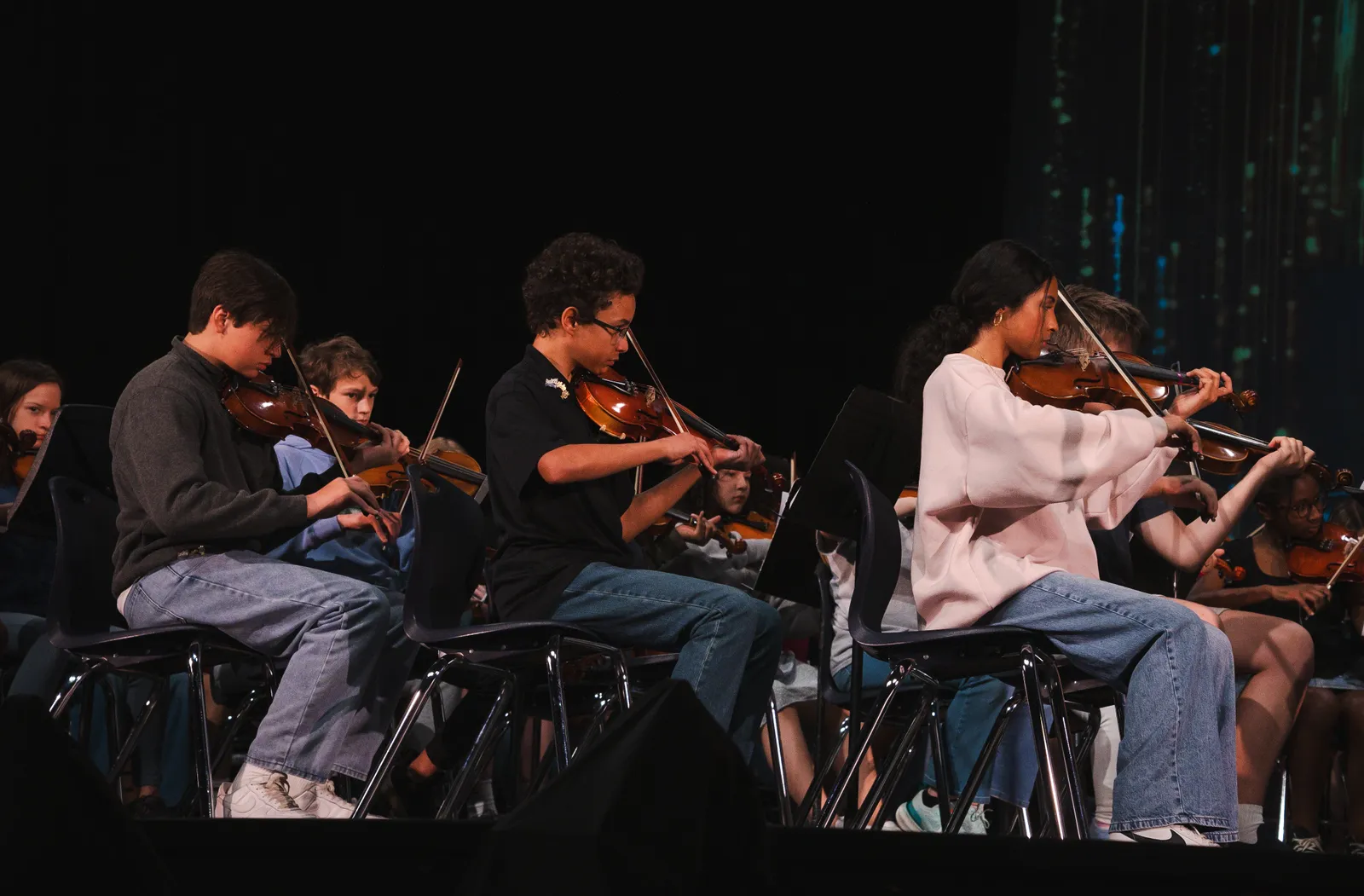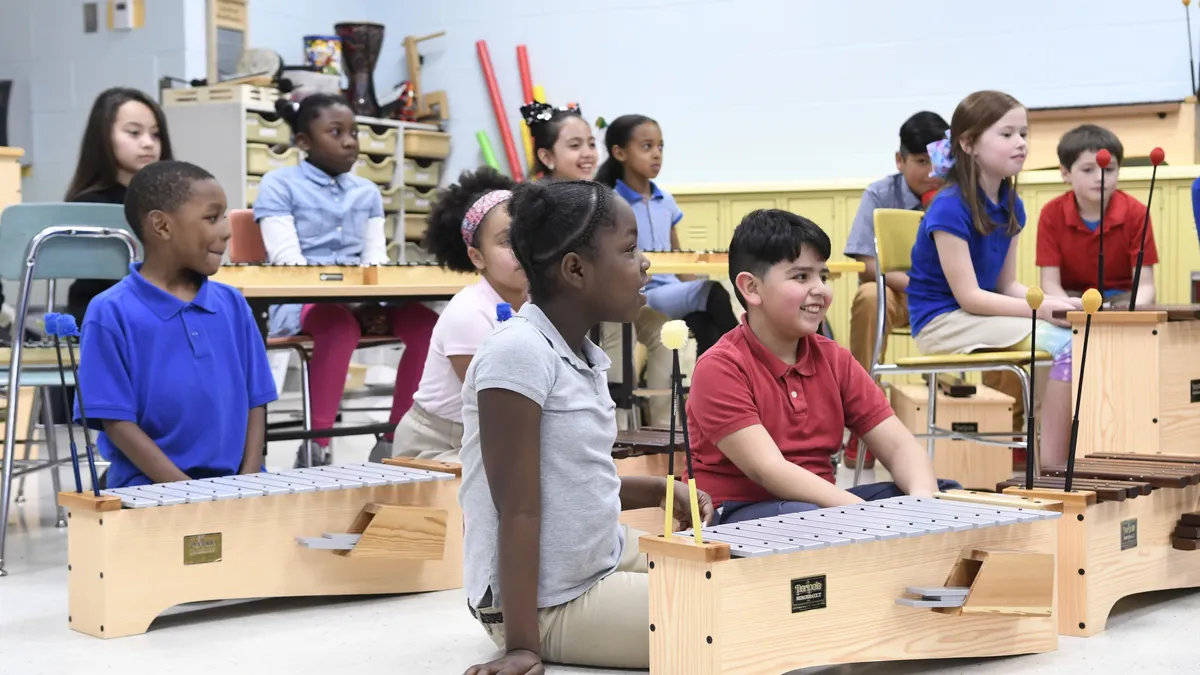When Tennessee's Tullahoma City Schools conducted a survey in 2021 to determine its music education needs, the rural school system discovered that not only were there not enough instruments for its 3,600 K-12 students — officials really didn't know where or what types of instruments it already had on hand.
With an investment of $50,500 from County Music Association Foundation and Music Has Value, two nonprofit organizations that support music education, as well as $25,000 from the district's own budget, Tullahoma received last fall enough new instruments — 278 — for all the music needs of every grade in the district.
Included in this recent investment are acoustic guitars, portable keyboards, ukuleles, double French horns and more.
Tullahoma is also now using a digitized music inventory system and providing training to music teachers on best practices for working with English learners and students with disabilities.
"We truly believe fine arts is more than just going to a music class or going to watch a play," said Tullahoma Superintendent Catherine Stephens. "It's really about bringing on the qualities that art allows us to experience through exploration."
Stephens said that when the instruments were presented to the schools, students and teachers alike were very excited. "It's that feeling of being seen and valued," Stephens said. "Tullahoma is this tiny little district, and look what happened."
"We have a true belief in what fine arts education, music education, means in the life of a child and a young adult into adulthood and beyond."

Catherine Stephens
Superintendent of Tullahoma City Schools
The CMA Foundation's partnership with Tullahoma doesn't end with the grant and delivery of instruments, said Stephens and Tiffany Kerns, CMA Foundation executive director. In fact, the partnership continues as the district commits to sustaining the maintenance and inventory of the new instruments with CMA Foundation's guidance, they said.
"I think everybody has to realize when you partner with an organization, there has to be value- value. That means to both groups," Stephens said. "It's not about 'give me, give me.' It really is about that responsibility and commitment."
She added, "We were willing to do the work."
Removing barriers to participation
Kerns said CMA Foundation's mission is to support all students through the arts. "We believe that every child deserves the opportunity to participate in music education," said Kerns, emphasizing that true participation includes access to musical instruments and instruction.
"It's not just as easy as saying we're going to buy some instruments, drop them off at a school and hope that they figure it out," Kerns said. The ultimate goal is that a school community understands and appreciates music education, she said.
The CMA Foundation began supporting K-12 music education in 2006 and has contributed about $30 million toward music education across the country. In 2018-19, the foundation partnered with the Tennessee Department of Education and Mr. Holland's Opus Foundation, another nonprofit supporting music education in schools, to better understand music and arts needs at Tennessee schools. After all, the state is where bluegrass, country, blues, southern gospel, and rock ‘n’ roll can trace their early beginnings, according to the Tennessee Historical Society.
The study analyzing Tennessee's music education needs found that participation in arts and music improved literacy and math performance and led to higher attendance rates.
However, the study also found systemic barriers to sequential music and arts education that prevented Tennessee students in all communities from "reaping the full benefits of a well-rounded education."
Some of the barriers cited include students not being able to meet eligibility criteria for music participation because of:
- Course prerequisites.
- Auditions.
- Before or after-school attendance.
- Fees.
- Commitments students need to make for effective engagement.
Music participation fees and equipment expenses can average about $250 per student, the study said.
Kerns said adding to the complexity is the thoughtful approach of how distinctive school-based music programs, such as orchestra, choral and band, need to be supported. "I think we pushed ourselves as an organization, and certainly as a board, to say, ‘How do we protect the investment, but how do we actually really strike thoughtful partnerships versus just being considered to be a funder?’" said Kerns of CMA Foundation's approach to building a partnership relationship with schools.
Part of that relationship is the district and foundation analyzing a school's music course offerings, chronic absenteeism, teacher capacity, feeder school patterns and existing music equipment, Kerns said.
Often, the foundation finds that a lack of instruments is not the problem but that scheduling conflicts hamper access to music education, Kerns said.
"The end goal is we've got to reach our kids. We've got to reach the students," Kerns said.
Understanding a district's specific needs
Metro Nashville Public Schools — whose home is nicknamed “Music City” — has been able to provide more professional development to music teachers and offer private lessons, coaching and new musical instruments through its partnership with the CMA Foundation, said Director of Schools Adrienne Battle, in an email to K-12 Dive.
The CMA Foundation's Music Teachers of Excellence program, which recognizes and rewards outstanding music educators, has boosted the morale of teachers and also enhanced the quality of music instruction to students, Battle said.
"The CMA Foundation and other music education initiatives have empowered MNPS to offer a range of programs and resources that would otherwise be unavailable," the director said.

She advises districts looking for potential partners to find organizations that have a vested interest in the community and a track record of supporting education. "Collaborate closely with these partners to understand the specific needs of your district and develop targeted initiatives that address those needs," Battle said.
Kerns echoes this, saying the foundation dedicates time through research and conversations to determine a district’s music education strengths and needs.
In Tullahoma, Stephens said investments in music education are having a positive ripple effect, because when music teachers feel valued, that leads to students feeling appreciated. And that influences parents' perspectives.
"We have a true belief in what fine arts education, music education, means in the life of a child and a young adult into adulthood and beyond," Stephens said.






 Dive Awards
Dive Awards













